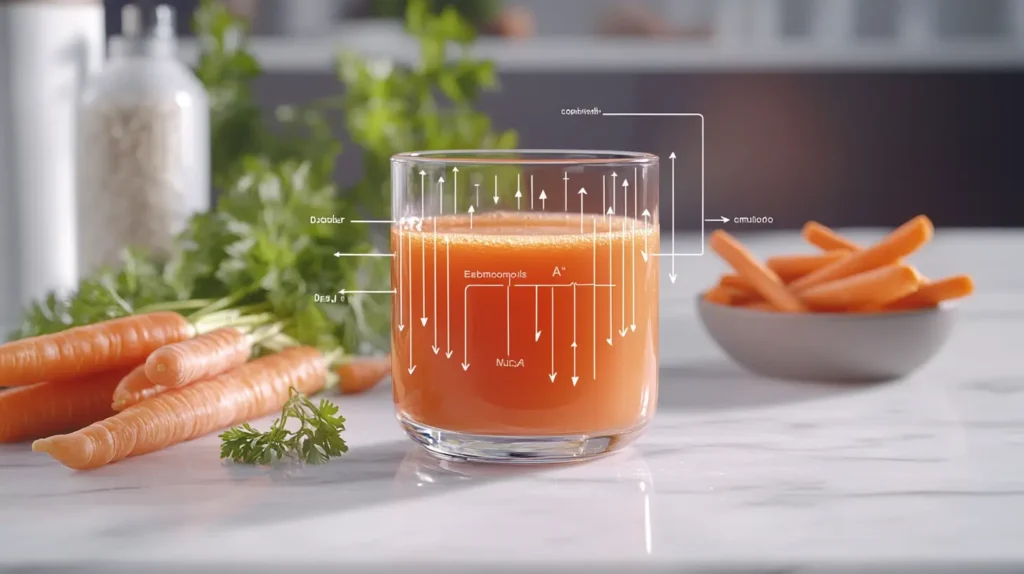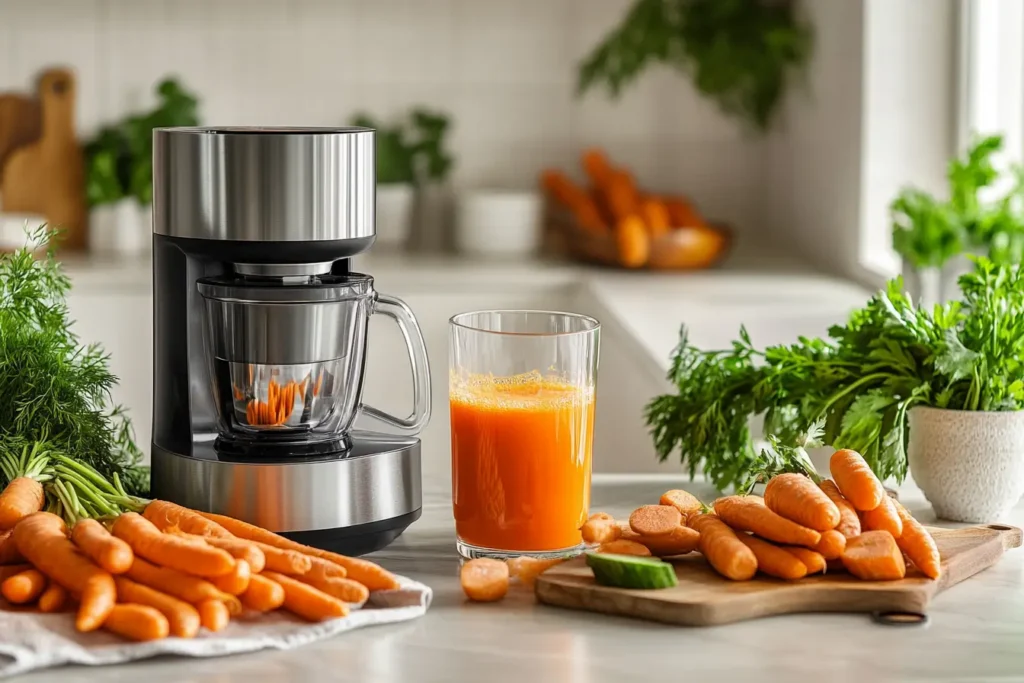Carrot juice has become a staple in many health-conscious diets, celebrated for its sweet taste and nutritional richness. Packed with essential vitamins like vitamin A, antioxidants such as beta-carotene, and a host of other nutrients, this vibrant orange beverage is a convenient way to boost your nutrient intake. However, determining how much carrot juice to drink daily is crucial for maximizing benefits while avoiding potential side effects. How much carrot juice should I drink a day? This question is more important than you might think, as the answer depends on your health goals, dietary needs, and personal preferences. Let’s delve deeper into the nutritional benefits, health impacts, and recommended daily intake of carrot juice to guide you in enjoying it safely.
Nutritional Highlights of Carrot Juice
Carrot juice is a nutrient-dense beverage that delivers a high concentration of essential vitamins and minerals. Its standout component is beta-carotene, a precursor to vitamin A, which supports vision, skin health, and immune function. Additionally, carrot juice provides ample amounts of vitamin C, which aids in collagen production and strengthens the immune system. Potassium, another key nutrient, helps regulate blood pressure and supports cardiovascular health. Other nutrients include vitamin K, which promotes bone health, and small amounts of calcium, iron, and magnesium.
Compared to raw carrots, carrot juice offers a concentrated dose of these nutrients. For instance, while raw carrots are high in dietary fiber, juicing them removes most of the fiber but amplifies the availability of vitamins and minerals. For example, an 8-ounce serving of carrot juice contains approximately 94 calories, 2 grams of protein, 22 grams of carbohydrates, and 9 grams of sugar. It also delivers over 250% of the daily value (DV) of vitamin A, 22% DV of vitamin C, and 31% DV of vitamin K.
This nutrient profile makes carrot juice a fantastic addition to your diet, but moderation is key. Drinking excessive amounts can lead to issues like vitamin A toxicity or increased sugar intake, especially if consumed in place of whole fruits and vegetables.

Why Carrot Juice Benefits Your Health
Carrot juice is not only delicious but also offers a wide range of health benefits. One of the most well-known benefits is its impact on eye health. The high beta-carotene content in carrot juice converts to vitamin A in the body, which is essential for maintaining good vision and preventing conditions like night blindness. Additionally, the antioxidants lutein and zeaxanthin found in carrot juice protect the eyes from harmful blue light and reduce the risk of age-related macular degeneration.
In terms of skin health, carrot juice shines as a natural beauty enhancer. The antioxidants help combat free radicals that can cause premature aging, while vitamin C supports collagen production for smoother, firmer skin. Regular consumption can even help reduce skin dryness and protect against sun damage, making it a favorite among skincare enthusiasts.
Carrot juice also plays a significant role in boosting the immune system. Its rich vitamin C content, combined with other antioxidants, strengthens the body’s defenses against infections. Meanwhile, potassium contributes to heart health by helping to lower blood pressure, and the drink’s overall antioxidant profile reduces oxidative stress, which is a risk factor for cardiovascular diseases.
Another noteworthy benefit is its liver detoxification properties. Carrot juice aids in flushing out toxins, reducing liver inflammation, and supporting overall liver health. For those seeking natural ways to cleanse their bodies, carrot juice is an excellent choice, but it’s important to pair it with a balanced diet for the best results. explore what homemade carrot juice is good for.
Potential Risks of Overdoing It
While carrot juice offers many benefits, overindulging can lead to several issues. One of the most visible risks is carotenemia, a condition caused by excessive beta-carotene intake. This condition results in yellowish skin discoloration, particularly noticeable on the palms and soles. Although harmless, it serves as a warning sign to scale back on your daily intake.
Another potential issue is vitamin A toxicity. Since carrot juice contains high levels of beta-carotene, drinking it excessively can lead to hypervitaminosis A, characterized by symptoms such as nausea, dizziness, and even liver damage in severe cases. This is why sticking to the recommended daily intake is essential.
Additionally, the natural sugars in carrot juice can pose risks for diabetics or those managing their blood sugar levels. An 8-ounce serving contains about 9 grams of sugar, which can cause spikes in blood sugar if consumed in large quantities. For individuals monitoring their carbohydrate intake, diluting carrot juice or pairing it with high-fiber foods can help mitigate these effects.
The Ideal Amount
To safely enjoy carrot juice, it’s important to adhere to the recommended daily intake. For adults, 4-8 ounces of carrot juice per day is generally considered safe and beneficial. Children should consume smaller portions, typically around 2-4 ounces, depending on their age and nutritional needs.
Best practices for consuming carrot juice include pairing it with meals to slow sugar absorption, diluting it with water to reduce its sugar concentration, and rotating it with other vegetable juices to diversify your nutrient intake. For instance, combining carrot juice with celery or cucumber juice can create a balanced, hydrating drink.
For those with specific health goals, personalized recommendations are ideal. Pregnant women, for example, can benefit from carrot juice’s nutrient profile but should limit their intake to avoid excess vitamin A, which could harm the developing baby. Similarly, diabetics should consult with a healthcare provider to determine an appropriate serving size.
Best Practices for Enjoying this Juice

The timing of carrot juice consumption can also influence its benefits. Drinking it in the morning is a popular choice, as it provides a quick energy boost and delivers essential nutrients to start the day. Its natural sugars offer a gentle rise in energy levels, making it an excellent alternative to coffee or sugary breakfast drinks.
Carrot juice can also serve as a pre-workout drink. Its carbohydrate content provides a source of energy to fuel exercise, while its potassium helps prevent muscle cramps. Alternatively, enjoying it as a mid-afternoon snack can curb hunger and provide a refreshing break during a busy day.
Learn about what fruits pair with carrots to create unique juice blends.

Specific Health Conditions
Carrot juice can be a beneficial addition to diets for individuals with specific health conditions, but it requires careful consideration. For diabetics, managing portion size is crucial to avoid blood sugar spikes. Diluting carrot juice or combining it with low-sugar vegetable juices like spinach or kale can help.
Pregnant women can benefit from carrot juice’s rich supply of folate, vitamin A, and other nutrients that support fetal development. However, they should consult their doctor to ensure safe consumption levels. For children, carrot juice is a great way to introduce nutrients into their diet, but smaller servings are essential due to their lower caloric needs.
How to Prevent Risks Associated with this Juice
Preventing risks associated with carrot juice begins with moderation. Sticking to the recommended serving size is key, as is monitoring for signs of overconsumption, such as skin discoloration or digestive discomfort. Balancing carrot juice with other foods and drinks can help mitigate its sugar content and provide a broader range of nutrients.
Tips for Making this Juice
Making carrot juice at home ensures maximum freshness and nutrient retention. Start with fresh, organic carrots to minimize exposure to pesticides. Enhance the flavor by adding fruits like apples or oranges, or spices like ginger for an extra kick. Using a high-quality juicer will yield the best results, and consuming the juice immediately preserves its nutrients.
For tips and tricks, check out the ultimate guide to carrot juice recipes.
Carrot Juice vs. Multivitamins
When comparing carrot juice to multivitamins, one of the key differences lies in nutrient absorption. Carrot juice provides bioavailable nutrients in their natural form, which the body absorbs more efficiently than synthetic supplements. Additionally, it offers hydration and phytonutrients, which contribute to overall health.
Conclusion
Carrot juice is a powerhouse of nutrition, offering a wealth of benefits for eye health, skin radiance, heart function, and overall well-being. Its rich content of beta-carotene, vitamins, and antioxidants makes it a valuable addition to any diet. However, as with any nutrient-dense food, moderation is key. Consuming 4-8 ounces daily allows you to enjoy the benefits of carrot juice without the risks associated with overconsumption, such as carotenemia or excess sugar intake.
Incorporating carrot juice into your routine can be simple and versatile. Whether enjoyed on its own, mixed with other juices, or paired with a meal, it’s a delicious way to support a healthy lifestyle. By balancing carrot juice with whole fruits and vegetables, you can make it part of a well-rounded diet that nourishes both your body and mind.
So, the next time you pour yourself a glass of carrot juice, you can feel confident knowing you’re making a choice that benefits your health. Cheers to enjoying this vibrant, nutrient-packed drink responsibly!
FAQs
Is it okay to drink carrot juice every day?
Yes, it’s generally safe to drink carrot juice daily, provided you consume it in moderation. A daily intake of 4–8 ounces is recommended for most adults. Drinking carrot juice every day provides essential nutrients like vitamin A, beta-carotene, and potassium, which are great for your skin, eyes, and overall health. However, overconsumption can lead to carotenemia, a harmless condition where your skin may develop an orange tint due to excessive beta-carotene. To avoid this, balance your carrot juice intake with a varied diet rich in other fruits and vegetables.
What is the best time to drink carrot juice?
The best time to drink carrot juice is in the morning on an empty stomach. This allows your body to absorb the nutrients more efficiently and kickstart your day with an energy boost. If mornings don’t work for you, carrot juice can also serve as a refreshing midday snack or pre-dinner beverage. Avoid drinking it late at night, as its natural sugars might be too stimulating before bed. Pairing it with your breakfast or having it as a stand-alone drink ensures you reap the maximum benefits.
How long does it take to see results from drinking carrot juice?
The time it takes to see results varies depending on your body and how often you consume carrot juice. Drinking it consistently (4–8 ounces daily) could show visible benefits, such as improved skin glow and better digestion, within 2–4 weeks. For deeper health benefits, like enhanced eye health or improved immune function, it may take a couple of months of regular intake. Keep in mind, results are best achieved when carrot juice is part of a balanced diet and healthy lifestyle.
Is 100% carrot juice healthy?
Yes, 100% carrot juice is extremely healthy when consumed in moderation. It is rich in essential vitamins like A, C, and K, as well as minerals like potassium and antioxidants. These nutrients support your immune system, eye health, and skin vitality. However, 100% carrot juice can also be high in natural sugars, so it’s important to limit your intake to avoid blood sugar spikes, especially for diabetics. Always opt for freshly made or pasteurized carrot juice without added sugars to maximize its health benefits.

